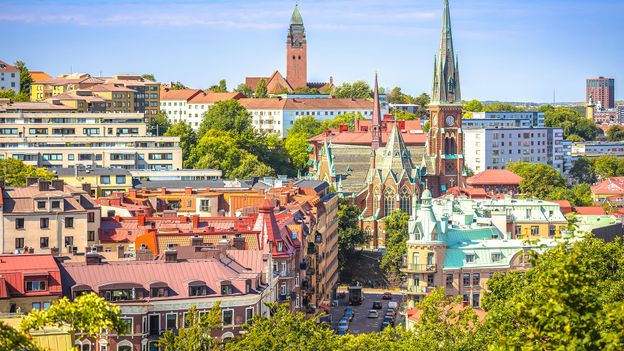Runner-up on the list – and the second of eight Nordic cities to make the top 10 – is Oslo, which also was named the official European Green Capital in 2019. Perhaps paradoxically, given Norway’s economic dependence on oil and gas, the country routinely gets top marks for its sustainability commitments. It makes sense that Oslo, Norway’s capital, does, too.
Walk around Oslo, and this commitment is clear. In terms of transport alone, the city has 270 city bike stations, 5,000 electric vehicle charging stations and has introduced electric scooters. Then there’s how green the city is, literally. Most of the municipality – 63% – is forest. Another 9% is made up of green areas and city parks.
But many of the sustainability initiatives have been behind the scenes, says Anne-Signe Fagereng, marketing manager of Oslo’s tourism board, VisitOSLO. “We do green ‘nudging’ with the tourists that come here,” she said. “When you look at our website, you won’t see that we put lots of green leaves everywhere, or call everything ‘sustainable’. But we try to make the sustainable choices the more go-to choices, if you will.”
The website highlights restaurants like Maaemo, which has received a Michelin Green Star for its sustainable practices; and accommodations like the Thon Hotel Astoria, an environmentally certified budget hotel that cuts its carbon footprint by using renewable energy. VisitOSLO also has developed its own criteria for businesses to receive a “Visit Oslo Responsibly” badge and has dedicated resources like its Green Guide for tourists who want to prioritise sustainable options, too.
Offline, the tourism board is incorporating the same principles. At the tourist office, if a visitor asks for advice on how to get from point A to point B, the staff will provide them with information about public transport first, Fagereng said. The tourism board has also developed a course in sustainable business practice for the travel industry, with topics like reducing wood waste or minimising noise pollution.
Fagereng is realistic about the challenges: as long as flying to a destination remains a necessity, for example, it’s all but impossible to say travel anywhere is a “sustainable” choice. But she’s optimistic. “As a whole, the travel industry isn’t sustainable. But we are really making huge efforts to go in that direction,” she said. “Tourism can be a force for good.”










